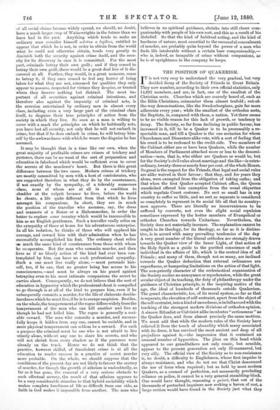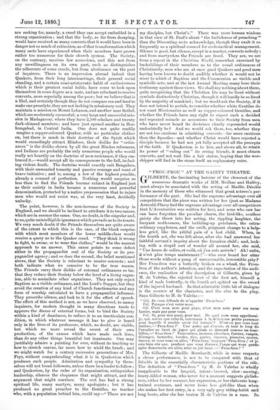THE POSITION OF QUAKERISM.
IT is not very easy to understand the very gradual, but very decided decay of the Society of Friends in Great Britain They now number, according to their own official statistics, only 14,892 members, and are, in fact, one of the smallest of the Christian sects. Churches which are scarcely heard of, such as the Bible Christians, outnumber them almost tenfold ; out-of. the-way denominations, like the Swedenborgians, gain far more adherents every year; while the smallest of the orthodox sects, the Baptists, is, compared with them, a nation. Yet there seems to be no visible reason for this lack of growth, or tendency to decay. The Society, so far from declining in public favour, has increased in it, till to be a Quaker is to be presumably a re- spectable man, and till a Quaker is the one sectarian for whom Churchmen and Dissenters alike vote, with a sort of feeling that his creed is to be reckoned to the credit side. Two members of the Cabinet either are or have been Quakers, while the number of Members of Parliament attached more or less to the denomi- nation—men, that is, who either are Quakers or would be, but for the Society's civil rules about marriage and the like—is extra- ordinary, twenty-three or nearly four per cent. of the whole House. So great is the respect for the Friends, that legal and social rules are alike waived in their favour; that they, and for years they alone, were exempted from the obligation of taking oaths ; and that when the first Quaker accepted Cabinet office, the Queen unsolicited offered him exemption from the usual etiquettes which regulate Court costume. No sect so small has in any country to suffer so little, and no sect so separate is considered so completely to represent in its social life all that its country- men approve. There are literally no inconveniences to be suffered by converts, not even the slight social repulsion sometimes expressed by the hotter members of Evangelical or orthodox Churches towards Unitarians. Nevertheless, the Society does not materially increase. The explanation cannot be sought in its theology, for its theology, so far as it is distinc. tive, is in accord with many prevailing tendencies of the day A very great number of the liberal orthodox are strongly drawn towards the Quaker view of the Inner Light, of that action of the Holy Spirit as a guide to the purified conscience of each individual in the affairs of life, which is the central idea of all Friends ; and many of them, though not so many, are inclined towards the Quaker deduction that external ordinances are superfluous, or hampering limitations on the action of that light. The non-priestly character of the ecclesiastical organisation of the Society excites no annoyance or reprehension, while the great secular object of its teaching, the duty of philanthropy under the guidance of Christian principle, is the inspiring motive of the age, the ideal of hundreds of thousands outside Quakerism. The grand characteristic, too, of its moral system, so far as that is separate, the elevation of self-restraint, apart from the object of the self-restraint, into a kind of sacredness, is in full accord with the teaching of the strongest modern divisions of orthodox opinion. A. sincere Ritualist or Calvinist alike inculcates "seriousness "as the Quaker does, and from almost precisely the same motives. 'We must add that while the modern rules of the Society have relieved it from the touch of absurdity which many associated with its dress, it has survived the most ancient and deep of all prejudices against it,—the impression that it contained an unusual number of hypocrites. The jibes on this head which appeared to our grandfathers not only comic, but sensible, appear to the present generation not only ill-mannered, but very silly. The official view of the Society as to non-resistance is, no doubt, a difficulty to Englishmen, whose first impulse is always resistance, and who do not see that Christ denounced the use of force when required; but as held by most modern Quakers, as a counsel of perfection, not necessarily precluding reliance on police, it cannot be a very general stumbling-block. One would have thought, reasoning a priori, that out of the thousands of perturbed inquirers now seeking a haven of rest, a, large section would have found in the Society just what they
are seeking for, namely, a creed they can accept embedded in a strong organisation ; and that the body, so far from decaying, would have received so many converts that it would have been in danger not so much of extinction, as of that transformation which many sects have experienced when their members have grown rather too numerous for their church system. The Society, on the contrary, receives few accessions, and this not from any unwillingness on its own part, such as distinguishes the adherents of some creeds, but from abstinence on the part of inquirers. There is an impression abroad indeed that Quakers, from their long intermarriage, their general social standing, and a certain semi-aristocratic habit of exclusiveness which is their greatest social foible, have come to look upon themselves in some degree as a mate, and are reluctant to receive converts, more especially among the poor; but we believe that is a libel, and certainly though they do not compass sea and land to make one proselyte, they are not lacking in missionary zeal. They maintain a mission on Mount Lebanon, and another near Bethel, which are moderately successful; a very large and successful mis- sion in Madagascar, where they have 2,500 scholars and twenty dark-skinned members ; and have just opened another in Hos- hungabad, in Central India. One does not quite readily magine a copper-coloured Quaker, with no particular clothes on, but there is much in their doctrine of the Spirit which would exceedingly attract Hindoos, their dislike for " ordin- ances " is the dislike shown by all the great Hindoo reformers, and Indians are probably the only numerous people who would really act heartily on the doctrine of no n-resistance, if they em- braced it,—would accept all its consequences to the full, includ- ing violent death. The doctrine would exactly suit Bengalees, with their unwearied tenacity and passive courage and want of brave initiative ; and is, among a few of the highest pundits, already a counsel of perfection. Nothing would surprise us less than to find the Friends become extinct in England just as their society in India became a numerous and powerful denomination, protected by a native prepossession that to injure men who would not resist was, at the very least, decidedly unlucky.
The point, however, is the non-increase of the Society in England, and we should be inclined to attribute it to two causes, which are in essence the same. One, no doubt, is the singular and, to us, quite unintelligible ignorance which prevails as to its tenets. We very much doubt if the Friends themselves are quite aware of the extent to which this is the case, of the blank surprise with which most members of the lower middle-class would receive a query as to the Quaker creed. "They think it wrong to fight, to swear, or to wear fine clothes," would be the nearest approach to an answer. This cause points to some defect either in the propagandist zeal of the Society or its pro- pagandist agency; and so does the second, the belief mentioned above, that the Society is reluctant to receive converts ; and both indicate what we conceive to be the true reason. The Friends carry their dislike of external ordinances so far, that they reduce their Society below the level of a living organ- ism, able to assimilate other organisms. They not only reject Baptism as a visible ordinance, and the Lord's Supper, but they avoid the creation of any kind of Church functionaries and any form of worship calculated to have a propagandist influence. They prescribe silence, and look to it for the effect of speech. The effect of this method is not, as we have observed, to annoy inquirers, for modern thought in many directions tends to approve the disuse of external forms, but to bind the Society within a kind of dumbness, to reduce it to an inarticulate con- dition, in which whatever message it has to give is heard only in the lives of its professors, which, no doubt, are visible, but which no more reveal the secret of their own production, of the causes which have made such lives, than do any other things beautiful but inanimate. One may justifiably admire a painting for ever, without its teaching us how to stretch canvas, far more how to wield the brush; and we might watch for a century successive generations of Mrs. Frye, without comprehending what it is in Quakerism which produces such people. Admiration and sympathy by them- selves will not breed followers, unless there be a leader to follow ; and Quakerism, by the rules of its organisation, extinguishes leadership, silences the eloquence that might attract, and the argument that might convince. The sect has had a strong spiritual life, many martyrs, many apologists ; but it has produced no great preacher to the Gentiles, no teacher who, with a population behind him, could say—" These are not my disciples, but Christ's." There was more human wisdom in that view of St. Paul's about "the foolishness of preaching" than the Dissenting sects acknowledge, though they exalt it so frequently as a spiritual counsel for ecclesiastical management. Silence is good, but silence, except in a martyr, converts nobody ; and from martyrdom the Friends are freed. They are, we see from a report in the Christian Woad, somewhat exercised by backslidings of their members as to the usual ordinances of Christianity, men who are at once good Quakers and good men having been known to doubt audibly whether it would not be wiser to admit of Baptism and the Communion as visible and symbolic acts, and at the last Annual Meeting many bore their testimony against those views. We shall say nothing about them,. quite recognising that the Christian life may be lived without symbols distinctively Christian, though it will hardly be so lived by the majority of mankind ; but we would ask the Society, if it does not intend, to perish, to consider whether white Gentiles do not want Missionaries as well as copper-coloured Gentiles, and whether the Friends have any right to expect such a decided and repeated miracle as accessions to their Society from men who have never heard its doctrines clearly expounded would undoubtedly be ? And we would ask them, too, whether they are not too cautions in admitting converts—far more cautions than the Apostles—and whether Christ would have rejected a disciple because he had not yet fully accepted all the precepta of the faith. If Quakerism is to live, and above all, to retain its power of "ruling out" its erring friends, it must obtain converts, and not wait like a fair statue, hoping that the wor- shipper will find in the stone itself an explanatory voice.



































 Previous page
Previous page